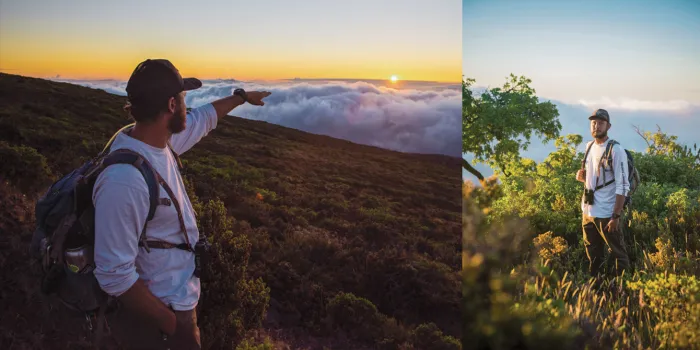I grew up in Three Rivers, California, where both my parents worked for the National Park Service (NPS) at Sequoia National Park. We actually lived inside the park until I was around 5. I started working for the NPS at the age of 15 as a maintenance employee. At 26, I’ve already worked in several parks, from Sequoia National Park, to the Channel Islands National Park in Southern California, to three parks in southeast Arizona, to Yosemite, to my current job at Haleakala National Park in Kula, Hawaii, on the island of Maui, where I’m the field crew lead for the Endangered Wildlife Management Program.
I always knew I wanted to work for the NPS. I studied environmental science and resource management at California State University Channel Islands. It’s a hypercompetitive field, since everyone wants these jobs. I recognize the importance and significance of these environments, and I want to play a role in protecting them and being able to share these places with others in perpetuity.
My daily job means being out in the park, where I use a huge array of skills, from helicopter usage to search-and-rescue techniques to how to capture bats. I also did pistol and rifle firearms training, since our job is to control non-native species like feral pigs, goats and deer that decimate the plant population and native birds. Just the other day I had a 20-minute helicopter flight past all kinds of waterfalls. Then we landed, busted out our machetes and chainsaws and cleared brush, and set out snares for feral pigs.
My parents learned I had hemophilia when I was about 8 months old. My mother had gotten tested before I was born, and as I was beginning to crawl around, I was getting bruises and swelling. Growing up, taking care of myself with factor VIII infusions became as routine as brushing my teeth, knowing “it’s a factor day, or it’s a nonfactor day.” My parents encouraged me to have a normal life. We were very fortunate, especially with me being diagnosed at such a young age, because where we lived we had no access to huge hospitals. But we did have access to park medics who would assist my folks with my infusions as needed. It was awesome to have the park community to help.
I am definitely aware of my limitations. Even though I surf and kayak and rock climb, I can’t run because the physical impact is too much for my ankles. But I can hike like crazy. I do sometimes question, when I’m fatigued, if it’s my hemophilia making me sore or the 22 miles I just hiked.
My hemophilia is always a consideration, but if you understand how your body performs, you figure out what your body can do and likes to do, and you stay within that range. My parents have always been very supportive, even though they’ve worried about me and always will worry.
My advice to other people with bleeding disorders is to educate yourself and those you’re involved with—your co-workers, your girlfriend, boyfriend or spouse. Avoid all the old-school taboos; being well-informed, you can make decisions about what you can and can’t do and manage accordingly.

